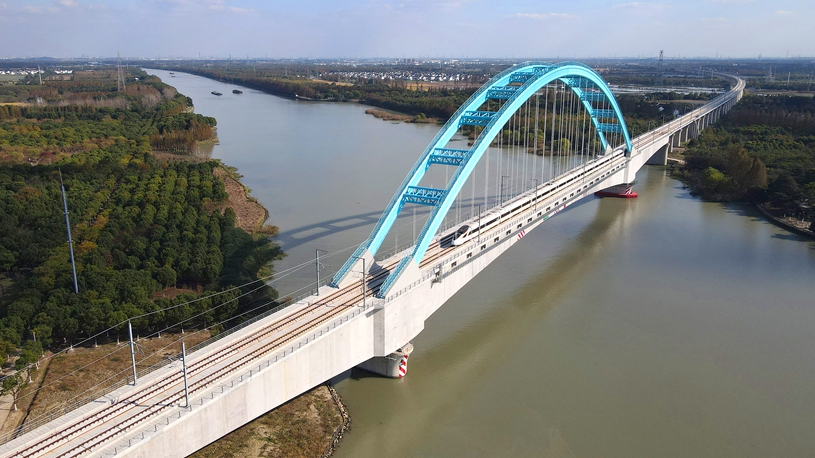* The 100,000th China-Europe freight train departed from southwest China's Chongqing Municipality last week, a significant milestone in the development of the service that facilitates economic and trade exchanges between China and Europe.
* More than 50,000 types of goods have been transported via China-Europe freight train service, reaching 227 cities across 25 European countries and over 100 cities in 11 Asian nations.
* Over the years, cities across China -- particularly hinterland hubs such as Chengdu, Xi'an, Urumqi, Zhengzhou, Wuhan, Ganzhou, Kunming and Hefei -- have joined the China-Europe freight-train network, solidifying inland China's connection to global markets.
CHONGQING, Nov. 25 (Xinhua) -- European and Chinese businesses, along with relevant government departments, are preparing a welcoming ceremony to mark the historic arrival of the 100,000th China-Europe freight train, which is scheduled to reach Duisburg, Germany, this week.
The train, loaded with goods including electronics, vehicles, auto parts, machinery and household appliances, departed from Chongqing Municipality in southwest China last week, marking a significant milestone in the development of the railway service that enhances economic and trade exchanges between China and Europe.
In March 2011, the China-Europe freight train (Yuxin'ou) service was launched from Chongqing to Duisburg, establishing a direct overland trade corridor between China and Europe.
Over the past 13 years, this service has brought substantial benefits to people in countries along its routes, improving logistics and connectivity across the Eurasian continent while advancing high-level opening up in China's inland regions.
FROM LANDLOCKED TO LINKED
Watching the departure of the 100,000th train, Kang Qinbin from Lifan Technology, a motorcycle and automobile manufacturer headquartered in Chongqing, recalled the company's memorable experience as one of the first clients of the China-Europe freight train in March 2011.
"The service solved our logistical challenges," Kang said, explaining that before the service's launch, exports from Chongqing were transported either by the slow maritime routes through coastal regions or by expensive air freight.
Since the freight train's inception, the transit time for Lifan's products bound for Eastern Europe has been cut by over 50 percent, enabling the company to secure a strong presence in overseas markets.
Over the years, cities across China -- particularly hinterland hubs such as Chengdu, Xi'an, Urumqi, Zhengzhou, Wuhan, Ganzhou, Kunming and Hefei -- have joined the China-Europe freight-train network, solidifying inland China's connection to global markets.
Today, more than 50,000 types of goods, including Chongqing's machinery and electronics, Sichuan's ornamental plants, and Jiangxi's daily necessities and furniture, are transported via the service, reaching 227 cities across 25 European countries and over 100 cities in 11 Asian nations.
So far, the service has transported over 11 million twenty-foot equivalent units containers of goods, valued at more than 420 billion U.S. dollars, according to China State Railway Group Co., Ltd. (China Railway).
Wei Wei, a logistics official from China Railway's Nanchang branch, highlighted the critical role these trains play in fostering economic cooperation between China's inland regions and the rest of the world.
MUTUAL BENEFITS
The benefits of the China-Europe freight trains extend beyond China, fostering growth in countries along its routes.
In Duisburg, Germany, the service has created new logistics activity, new industries, as well as new industrial parks and commercial centers, generating over 20,000 local jobs.
Markus Teuber, China affairs commissioner of the City of Duisburg, has closely followed the development of the service between China and Duisburg on behalf of the Port of Duisburg.
Teuber said that, initially, there were doubts about the feasibility of such a complex logistics project, however, the operations over the years have proven to be a success, fostering improved trade between Germany and China, offering both ecological and economic benefits for companies in both countries.
"The train connection has definitely led to a win-win situation for both countries," he said, adding that he is confident that the service will continue to thrive, as its benefits for imports and exports remain strong, and more companies are recognizing its value.
Markus Bangen, CEO of Duisburger Hafen AG (Duisport), a German company running the port of Duisburg, said that the railway service is strengthening ties between Europe and China, opening up a new international transport market that benefits both economies. Duisburg's profile is steadily growing as a key stop on the railway, attracting investment, creating job opportunities and driving growth in the logistics sector, he added.
The train service is playing an increasingly important role in stabilizing global supply chains in a complex geopolitical environment, he noted.
"The China-Europe freight-train network connects domestic and international regions, establishing a comprehensive logistics system that spans the Eurasian continent," said Zhang Xiaotao, head of the School of International Trade and Economics at the Central University of Finance and Economics.
"It has strengthened trade ties and promoted deeper economic integration across Eurasia," Zhang said, adding that the network is expected to become more sophisticated, offering diverse services.
Li Chao, a spokesperson for the National Development and Reform Commission (NDRC), said that "the 100,000th China-Europe freight train is just the beginning."
"The China-Europe freight-train service is expected to continue improving and expanding. The NDRC, in collaboration with China Railway and other relevant parties, will focus on boosting efficiency, enhancing safety management, diversifying transport routes and driving innovation. Efforts will also be intensified to accelerate the expansion of the international cooperation network, fostering the safe, stable and high-quality development of the China-Europe freight train network," Li said.
(Video reporter: Zhao Yufei, Wu Kunpeng, Li Aibin, Zhao Xiaoshuai, Wang Qiwen, Xing Guangli, Bu Ji'ao, Li Jieqiong; Video editors: Zhang Li, Wei Yin)■











